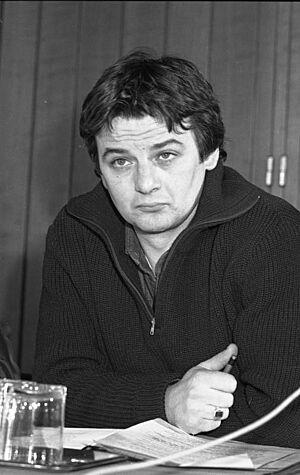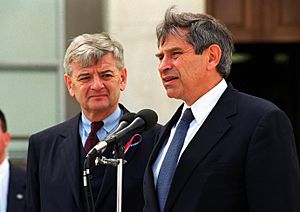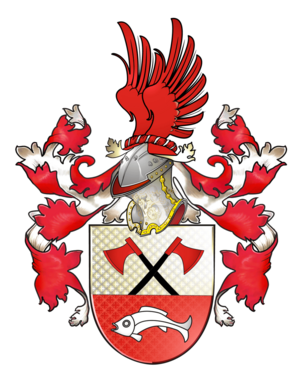Joschka Fischer facts for kids
Quick facts for kids
Joschka Fischer
|
|
|---|---|
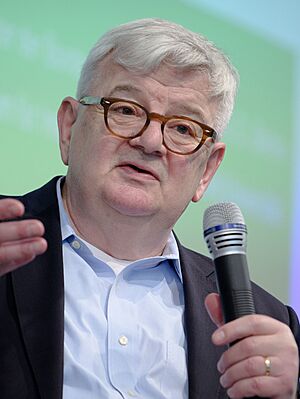
Fischer in 2018
|
|
| Vice Chancellor of Germany | |
| In office 27 October 1998 – 22 November 2005 |
|
| President | Roman Herzog Johannes Rau Horst Köhler |
| Chancellor | Gerhard Schröder |
| Preceded by | Klaus Kinkel |
| Succeeded by | Franz Müntefering |
| Federal Minister of Foreign Affairs | |
| In office 27 October 1998 – 22 November 2005 |
|
| Chancellor | Gerhard Schröder |
| Preceded by | Klaus Kinkel |
| Succeeded by | Frank-Walter Steinmeier |
| Member of the Bundestag for Hesse |
|
| In office 16 October 1994 – 1 September 2006 |
|
| Constituency | Alliance 90/The Greens List |
| In office 6 March 1983 – 31 March 1985 |
|
| Preceded by | The Greens List |
| Deputy Minister President of Hesse | |
| In office 5 April 1991 – 5 October 1994 |
|
| Prime Minister | Hans Eichel |
| Preceded by | Wolfgang Gerhardt |
| Succeeded by | Rupert von Plottnitz |
| Hessian Minister of Environment and Energy | |
| In office 12 December 1985 – 9 February 1987 |
|
| Prime Minister | Holger Börner |
| Preceded by | Position established |
| Succeeded by | Armin Clauss (Acting) |
| In office 5 April 1991 – 5 October 1994 |
|
| Prime Minister | Hans Eichel |
| Preceded by | Karlheinz Weimar |
| Succeeded by | Rupert von Plottnitz |
| Hessian Minister of Federal Affairs | |
| In office 5 April 1991 – 5 October 1994 |
|
| Prime Minister | Hans Eichel |
| Preceded by | Wolfgang Gerhardt (Agent of Federal Affairs) |
| Succeeded by | Rupert von Plottnitz |
| Personal details | |
| Born |
Joseph Martin Fischer
12 April 1948 Gerabronn, Württemberg-Baden, Allied-occupied Germany |
| Political party | Alliance 90/The Greens |
| Spouses |
Edeltraud Seifert
(m. 1967; div. 1984)Inge Peusquens
(m. 1984; div. 1987)Claudia Bohm
(m. 1987; div. 1998)Nicola Leske
(m. 1999; div. 2003)Minu Barati
(m. 2005) |
| Children | 2 |
Joseph Martin "Joschka" Fischer (born 12 April 1948) is a famous German politician from the Alliance 90/The Greens party. He was Germany's foreign minister and vice chancellor from 1998 to 2005, working alongside Chancellor Gerhard Schröder.
Fischer was one of the most important leaders of the German Green party for many years. For a long time, opinion polls showed he was the most popular politician in Germany. After the 2005 election, a new government was formed, and Fischer left his office on 22 November 2005. He later supported the Spinelli Group, an organization that wants to create a more united European Union.
Contents
Early Life and Activism
Joseph Martin Fischer was born in Gerabronn, Germany, on 12 April 1948. His family was originally from Hungary but had to leave after World War II. His nickname, "Joschka," comes from the Hungarian name for Joseph.
Fischer left high school in 1965 without graduating. He did not go to college or serve in the military. In the late 1960s, he became involved in the student protest movement. He moved to Frankfurt am Main and joined groups that wanted to make big changes in society.
During this time, Fischer took part in many street protests. Some of these protests led to clashes with the police. Years later, as a politician, he apologized for the violence that happened during that time. He also studied the writings of thinkers like Karl Marx and Mao Zedong.
In the 1970s, a period known as the German Autumn, Germany faced serious problems with political violence. Witnessing these events made Fischer change his mind. He decided that violence was not the right way to achieve political goals. He then became active in peaceful movements, which led him to join the newly created Green Party.
A Career with the Green Party
From 1983 to 1985, Fischer was a member of the Bundestag, Germany's national parliament, for the Green Party. He was known for his direct and sometimes confrontational style in debates.
In 1985, he became the Minister for the Environment in the state of Hesse. This was part of the first-ever "Red-Green coalition," a government formed by the Social Democratic Party (SPD) and the Greens. Fischer made headlines when he wore trainers (sneakers) to his official swearing-in ceremony, which was very unusual for a politician at the time.
From 1991 to 1994, he served as environment minister in Hesse again. After that, he became a leader of the Green Party's group in the Bundestag. He was a skilled speaker and became very popular. He helped move the Green Party towards the political center, which made it possible for them to join the national government later on.
Germany's Foreign Minister
In 1998, Gerhard Schröder's SPD won the election and formed a coalition government with the Green Party. Fischer was appointed as Foreign Minister and Vice Chancellor. As foreign minister, his job was to manage Germany's relationships with other countries.
The Kosovo War
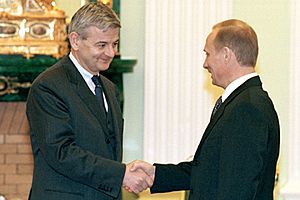
One of the first major challenges for Fischer was the Kosovo War in 1999. He supported Germany's decision to send soldiers as part of a NATO mission to stop the violence in Kosovo. This was a very difficult decision for him and his party. The Green Party was founded on the idea of pacifism (being against war), and this was the first time since World War II that German soldiers were sent into combat. Fischer argued it was necessary to prevent a great human tragedy.
Relations with the United States
Fischer often had different views from the United States government, especially under President George W. Bush. They disagreed on important topics like the International Criminal Court and the Kyoto Protocol (an agreement to fight climate change).
The biggest disagreement was over the 2003 Iraq War. Fischer and Chancellor Schröder were strongly against the war. At a major security conference in 2003, U.S. Defense Secretary Donald Rumsfeld presented reasons for the war. Fischer famously replied, "Excuse me, I am not convinced." This moment made him very popular in Germany and around the world.
Working for Peace
Fischer was also very involved in trying to bring peace to the Middle East. He worked to help Israelis and Palestinians find a peaceful solution to their conflict. He helped arrange meetings between leaders from both sides and was seen as an important figure in the peace process.
In 2001, after the Taliban government was removed in Afghanistan, Fischer played a key role in helping the country form a new government. He hosted a major conference in Germany where Afghan leaders signed the Bonn Agreement, which set up a plan for Afghanistan's future.
Life After Politics
After the 2005 election, Fischer decided to step back from his leading role in politics. He said, "After 20 years of power, now I want my freedom back."
Since leaving office, he has worked as a visiting professor at Princeton University in the United States. He has also been an advisor for several companies and non-profit organizations. He is a founding member of the European Council on Foreign Relations, a group that thinks about Europe's role in the world.
Personal Life
Joschka Fischer has been married five times and has two children. He married his current wife, Minu Barati, in 2005.
For much of his life, Fischer was known for enjoying good food and wine. But in the late 1990s, he decided to get in shape. He started running and even completed several marathons, including the New York City Marathon and the Berlin Marathon.
In 2004, he had a personal coat of arms designed for him. A coat of arms is a special symbol that represents a person or family. His design includes crossed axes and a fish, which is a play on his last name, Fischer (which means "fisherman" in German).
Awards and Recognition
- 2002 – Honorary doctorate from the University of Haifa
- 2004 – Gottlieb Duttweiler Prize for his work
- 2006 – Honorary doctorate from Tel Aviv University
- 2009 – Leo Baeck Medal for promoting understanding
- 2012 – Honorary doctorate from the University of Michigan
- 2016 – Medal for Extraordinary Merits for Bavaria in a United Europe
See also
 In Spanish: Joschka Fischer para niños
In Spanish: Joschka Fischer para niños
 | Selma Burke |
 | Pauline Powell Burns |
 | Frederick J. Brown |
 | Robert Blackburn |


